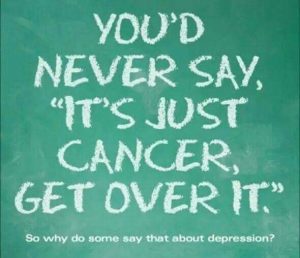'Get Over It' Is Unhelpful Advice for Mental Illness Sufferers

The phrase “get over it” is something the mental health community has heard and spoken out against many times (What Is Stigma?). In particular, we hear it applied to depression and anxiety, but likely because those are the two mental illnesses that are most spoken about. The problem is, even though we’ve discussed the phrase and the problems it presents, it’s still something we hear over and over again, which, to me, means it’s something we need to continue speaking out against. "Get over it" just isn't helpful advice for a person with a mental illness.
Stigma Behind the Phrase 'Get Over It'
When we hear the phrase “get over it,” the words mean so much more than we might first think. Here are a few meanings that I’ve chosen to discuss.
- The person who says it thinks whatever mental illness we’re struggling with isn’t something to be upset over or to still be upset over. This is likely a matter of not understanding the depth of mental illness and how it can truly affect someone. People need to realize putting a time-frame on suffering and struggling is unreasonable and unfair.
- People who say it think they would already be over it if it happened to them. For whatever reason, we seem to think that based on our own experiences, that’s how it should be for someone else, but that’s not how it works. We each experience things differently; and based on the own workings of our brains, it’s going to be different how long or short, or even how well we handle things.
- The person who says it thinks if you can’t get over it, you’re weak. The weakness stigma applies across the board, but I’ve seen it have a particularly negative impact on the men in my life. They feel that stigma even if they’ve never heard the words and struggle to get through things even more because they feel like they’re less of a man if they can’t just "get over" something.
'Get Over It' Silences People With Mental Illnesses

When someone hears the words "get over it," it’s a strong likelihood that he or she will shut down and stop speaking about his or her struggles. When that happens, people suffer in silence and don’t get whatever help they might need. There is so much hope for recovery and a better life, but silence almost guarantees a person will never get the opportunity to experience those things and never be able to know that reality for him or herself.
Because of that, we need to continue to work towards eliminating that phrase from our vocabulary and no longer saying it to the people around us.
Why Do People Say 'Get Over It' as Advice to the Mentally Ill?
For further discussion about why "get over it" is a part of our vocabulary, see here:
You can find Laura on Twitter, Google+, Linkedin, Facebook and her blog; also see her book, Project Dermatillomania: The Stories Behind Our Scars.
APA Reference
Barton, L.
(2016, September 4). 'Get Over It' Is Unhelpful Advice for Mental Illness Sufferers, HealthyPlace. Retrieved
on 2026, February 28 from https://www.healthyplace.com/blogs/survivingmentalhealthstigma/2016/09/get-over-it-is-not-helpful-advice-for-mental-illnesses
Author: Laura A. Barton
I've been told that I'm schizoaffective.mixed,bipolar 1, self harm , borderline personality disorder (ptsd)
I wish there was more blogs or articles online or elsewhere on the stigma of mental health. I get so frustrated and angry when family or friends say those words to me.
You are exactly on point. Just writing this gets my blood pumping.
I completely shut down and walk away. I am how are you expected to respond to such a comment.
I do believe Laura is correct in my experience when mentioning they are going off their own personal experience. For some reason they become an expert on how to safely talk to a mentally ill person. Even those who are trained do it badly. I have felt it myself.
I can't wait to draw more attention to this when I release my documentary on
"The stigmas of mental health. "
Great job Laura. I look forward to more of your written work.
Warm regards,
Lucy Lou
Hi Lucy,
Thanks so much for commenting. It's good to know I'm on the mark with this, although it sucks that you've had to go through it yourself.
Good luck with your film!
-Laura
